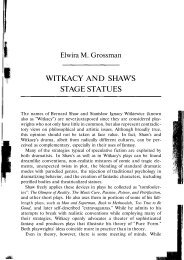Literary Exchanges: Scotland, Europe and World Literatures by ...
Literary Exchanges: Scotland, Europe and World Literatures by ...
Literary Exchanges: Scotland, Europe and World Literatures by ...
Create successful ePaper yourself
Turn your PDF publications into a flip-book with our unique Google optimized e-Paper software.
Visit the Scottish Writing Exhibition<br />
MLA, Los Angeles 2011, Booth #233–235<br />
<strong>Literary</strong><br />
<strong>Exchanges</strong><br />
<strong>Scotl<strong>and</strong></strong>, <strong>Europe</strong> <strong>and</strong> <strong>World</strong> Literature<br />
<strong>by</strong> Stuart Kelly<br />
This article originally appeared in Discovering Scottish Literature:<br />
A Contemporary Overview, published <strong>by</strong> Scottish Book Trust on<br />
behalf of the Scottish Government, 2008<br />
www.scottishbooktrust.com/adults/books/scottish-lit
“Goethe was the first to say: ‘National literature no longer means much these<br />
days, we are entering the era of Weltliteratur – world literature – <strong>and</strong> it us up to<br />
each of us to hasten this development’. This is, so to speak, Goethe’s testament.<br />
Another testament betrayed.” — Milan Kundera 1<br />
Introduction<br />
In the 16th century, to anyone in Continental <strong>Europe</strong>, the most famous writer from<br />
the British Isles was not Shakespeare, or Spenser, or Francis Bacon; but the Scottish<br />
Latinist George Buchanan, author of such works as the neo-Senecan drama Jephtha<br />
<strong>and</strong> the “republican accented” treatise on tyranny, De Iure Regni apud Scotus Dialogus.<br />
In the 19th century, Sir Walter Scott began his literary career <strong>by</strong> translating Goethe<br />
<strong>and</strong> Schiller, <strong>and</strong> at the end of his career had influenced writers in France, Germany,<br />
Italy, Spain, Portugal, the Netherl<strong>and</strong>s, Denmark, Norway, Sweden, Austria, Romania,<br />
Pol<strong>and</strong>, the Ukraine, Russia, the United States <strong>and</strong> Cuba. It was the French writer<br />
André Gide who first realised the complexity of The Private Memoirs <strong>and</strong> Confessions of<br />
a Justified Sinner <strong>by</strong> Scott’s contemporary James Hogg, <strong>and</strong> the writings of Stevenson,<br />
Conan Doyle <strong>and</strong> Buchan were an inspiration to Jorge Luis Borges, Vargas Llosa,<br />
Ngugi wa’Thiongo, Michael Chabon <strong>and</strong> Michel Houellebecq. As Kundera stresses,<br />
the history of literature is an international history.<br />
But <strong>Scotl<strong>and</strong></strong> is something of an anomaly. It participates in the supranational conversation<br />
that constitutes literature under conditions that are idiosyncratic <strong>and</strong> exceptional.<br />
We talk about a “national literature” – <strong>and</strong> there are several volumes which describe it,<br />
notably Robert Crawford’s <strong>Scotl<strong>and</strong></strong>’s Books (Penguin, 2007 – <strong>by</strong> far the best); Roderick<br />
Watson’s The Literature of <strong>Scotl<strong>and</strong></strong> (2 vols., Palgrave Macmillan, 1984, revised 2007);<br />
The Edinburgh History of Scottish Literature (3 vols., Edinburgh University Press,<br />
2006); Alba Literaria: A History of Scottish Literature, edited <strong>by</strong> Marco Fazzini (Amos<br />
Edizioni, 2005) <strong>and</strong> Carl MacDougall’s Writing <strong>Scotl<strong>and</strong></strong> (Polygon, 2004).<br />
But in what way is <strong>Scotl<strong>and</strong></strong> a nation Since it has no seat at the United Nations<br />
nor within the <strong>Europe</strong>an Parliament, it cannot at present be easily described. It is not a<br />
colonised entity (like the disputed regions of Tibet or Chechnya); nor an autonomous<br />
or semi-autonomous region (having fewer legislative powers, for example, than the average<br />
Swiss canton); it is not a linguistically homogenous territory (like Quebec or the<br />
Basque Region). 2 <strong>Scotl<strong>and</strong></strong> became part of Great Britain in 1707 with the Union of the<br />
Parliaments (following the 1603 Union of Crowns). Yet, as Michael Fry has observed,<br />
there were many viable small countries in 1707 that were latterly incorporated (the<br />
City State of Venice, the Electorate of the Palatinate of the Rhinel<strong>and</strong>, the Kingdom<br />
of Savoy) <strong>and</strong> that did not retain a lasting nationalist aspiration. 3 <strong>Scotl<strong>and</strong></strong> is, clearly,<br />
“different” <strong>and</strong> to a great extent its difference has been sustained <strong>by</strong> its literature. 4<br />
<strong>Scotl<strong>and</strong></strong>’s Modernism<br />
<strong>Scotl<strong>and</strong></strong> has a vexed relationship to the worldwide artistic movement that we call<br />
“Modernism”. The conditions which gave rise to Modernism were, of course, replicated<br />
1
2 Stuart Kelly<br />
in <strong>Scotl<strong>and</strong></strong>: dissatisfaction with the aesthetics of the previous generation, in particular<br />
in their inadequacy to cope with the new reality of the 1914–18 war; a rise in mass readership;<br />
the decentring effects of Marxist dialectics, Freudian psychoanalysis, Saussurian<br />
linguistics <strong>and</strong> Einstein’s relativity; the emergence of new media such as film <strong>and</strong> radio.<br />
In some localised cases – such as George Douglas Brown’s The House with the Green<br />
Shutters (1901) – there was a deliberate attempt to move away from the perceived<br />
sentimentality of the predominant “Kailyard” school. It remains the case, however,<br />
that whereas Modernism gave rise to a global resurgence in the novel – in the work<br />
of Woolf, Joyce, Proust, Mann, Bassani, Faulkner, Bely, Musil, Broch, Kafka, Hamsun,<br />
Alfau <strong>and</strong> Gombrowicz – <strong>Scotl<strong>and</strong></strong> did not respond to Modernism novelistically. Even<br />
such important works as Neil Gunn’s The Silver Darlings (1941) <strong>and</strong> Lewis Grassic<br />
Gibbon’s A Scots Quair trilogy (1932–4) remain securely within the naturalist tradition.<br />
This is of key importance to the contemporary situation of Scottish literature.<br />
<strong>Scotl<strong>and</strong></strong>’s Modernism was dominated <strong>by</strong> the figure of Hugh MacDiarmid<br />
(1892–1978, born Christopher Murray Grieve). He was identified as the centre of a<br />
new literary-political movement <strong>by</strong> the French scholar Denis Saurat, in an article entitled<br />
“Le Groupe de la Renaissance Écossaise”, published in 1924 in the Revue Anglo-<br />
Américaine; although the term had previously been used <strong>by</strong> MacDiarmid himself, <strong>and</strong><br />
was possibly taken from the work of Patrick Geddes (1854–1932), the botanist, urbanplanner,<br />
friend of Rabindranath Tagore <strong>and</strong> ancestor of the Situationist International.<br />
MacDiarmid was a nationalist, a communist, a cultural agitator <strong>and</strong> above all a poet. It<br />
is impossible, <strong>and</strong> unprofitable, to try to contain his poetics within a single definition.<br />
His earliest collections, Sangshaw (1925) <strong>and</strong> Penny Wheep (1926) were predominantly<br />
lyrical, <strong>and</strong> advocated the use of the Scots language; but in a manner more defamiliarising<br />
than couthy. His long poem, “A Drunk Man Looks At The Thistle” (1926)<br />
made overt his political <strong>and</strong> nationalistic aspirations, while continuing to explore the<br />
use of Scots in literary forms; <strong>and</strong> notably included translations, quotations or variations<br />
from Blok, Zippius, Lasker-Schüler, Rocher, Dostoyevsky, Mallarmé, Herman<br />
Melville <strong>and</strong> Dante. MacDiarmid was alert to world developments in literature, being<br />
one of the first to hail Wallace Stevens <strong>and</strong> befriending Ezra Pound. While never<br />
turning his back on Scots, later works extended this use of bricolage, <strong>and</strong> sought a<br />
synthesis of scientific <strong>and</strong> poetic discourses, most effectively in “On a Raised Beach”<br />
(from Stony Limits, 1934) <strong>and</strong> “In Memoriam James Joyce” (1955). He coined a<br />
memorable phrase, “the Caledonian antisyzygy”, meaning a peculiarly Scottish union<br />
of opposites, discrete psychologies suspended in equivalence, as a creative engine for<br />
the emerging nation. It has had an enduring legacy.<br />
MacDiarmid inspired a generation of writers, many of them immortalised in S<strong>and</strong>y<br />
Moffat’s 1984 painting Poets’ Pub. Sorley Maclean (1911–1996), the pre-eminent<br />
Gaelic poet of his generation, remembered the “miracle <strong>and</strong> mystery” of reading<br />
MacDiarmid. He originally shared many of MacDiarmid’s Communist sympathies<br />
(though he later recanted, while MacDiarmid went on to praise the 1968 invasion of<br />
Czechoslovakia), <strong>and</strong> succeeded in a similar programme of modernisation in Gaelic as
<strong>Literary</strong> <strong>Exchanges</strong>: <strong>Scotl<strong>and</strong></strong>, <strong>Europe</strong> <strong>and</strong> <strong>World</strong> Literature 3<br />
MacDiarmid had done in Scots. Maclean’s Gaelic was not insular or “Celtic twilight”,<br />
but engaged with its own circumstances as well as traditions. As he put it in his 1943<br />
Dàin do Eimhir, this was a poetry that throve on “Yeats is Blok is Uilleam Ros” –<br />
“Yeats <strong>and</strong> Blok <strong>and</strong> William Ross” (1762–90, Gaelic poet).<br />
Among the other poets were Sydney Goodsir Smith (whose novel, Carotid<br />
Cornucopius, (1947) was a valiant if flawed attempt at a Scottish Ulysses); Norman<br />
MacCaig, Robert Garioch (who translated Giuseppe Belli’s sonnets into vigorous<br />
Scots); Iain Crichton Smith <strong>and</strong> the Orcadian George Mackay Brown (who derived<br />
inspiration from skaldic verse <strong>and</strong> the saga tradition).<br />
MacDiarmid, like the dictators he admired, was fond of extravagant expulsions.<br />
Two are especially notable: Alex<strong>and</strong>er Trocchi (1925–1984) <strong>and</strong> Ian Hamilton Finlay<br />
(1925–2006). Trocchi was educated in Glasgow, <strong>and</strong> left for Paris on graduation. He<br />
was denounced <strong>by</strong> MacDiarmid at the 1962 Edinburgh Writer’s Conference as “cosmopolitan<br />
scum” after Trocchi claimed that sodomy was the basis of his own writing.<br />
In Paris, he edited a magazine, Merlin, which published Sartre, Beckett, Henry Miller<br />
<strong>and</strong> Pablo Neruda. Working for the legendary <strong>and</strong> notorious Maurice Girodias, he<br />
also published two existentialist-nuanced novels, Young Adam <strong>and</strong> Cain’s Book. He<br />
attempted to ignite an “invisible insurrection of a million minds” with his Sigma<br />
Project, was involved with Lettrism, the Situationist International <strong>and</strong> the Beat Poets,<br />
<strong>and</strong> succumbed to heroin addiction.<br />
Ian Hamilton Finlay was a recipient of Trocchi’s Sigma invitation, <strong>and</strong> was<br />
denounced <strong>by</strong> MacDiarmid (who had earlier been best man at his wedding) with the<br />
line “I wouldn’t have him carve my gravestone”. Finlay’s career began with relatively<br />
conventional, if beautiful, works such as The Dancers Inherit The Party (1960) <strong>and</strong><br />
Glasgow Beasts, An A Burd (1961). He became interested in concrete poetry, <strong>and</strong> in<br />
his magazine, Poor.Old.Tired.Horse, created one of the first UK platforms for the work<br />
of the Black Mountain School, the de Campos brothers, Eugen Gomringer, Ernst<br />
J<strong>and</strong>l <strong>and</strong> Pedro Xisto. Finlay had already remarked that he felt “an absolute need to<br />
turn from the rhythmic to the static”, <strong>and</strong> his greatest creation was a postmodern neoclassical<br />
garden of texts, growths, revolutions <strong>and</strong> dead-headings, Little Sparta. It was<br />
the site of a neo-Situationist confrontation with local authorities over tax rates, <strong>and</strong><br />
its deployment of imagery derived from the French Revolution <strong>and</strong> Nazi Germany<br />
led the French critic Catherine Millet (who later published her paean to the jouissance<br />
of r<strong>and</strong>om sex-acts) to denounce Finlay as a supporter of the regimes whose icons he<br />
transformed. Finlay is now acclaimed as the most significant artist of the 20th century<br />
in <strong>Scotl<strong>and</strong></strong>; but Little Sparta itself inadvertently raises the question of the Scottish<br />
artist’s situation: it can only be seen in <strong>Scotl<strong>and</strong></strong>, but draws on a world beyond it.<br />
One writer has had connections to both the MacDiarmid tradition <strong>and</strong> the latter<br />
“avant-garde” alternative, <strong>and</strong> has proved to be a dynamic inspiration to contemporary<br />
writers, both of prose <strong>and</strong> poetry: Edwin Morgan (1920–2010). Morgan is widely<br />
acclaimed as the most significant poet from <strong>Scotl<strong>and</strong></strong> since MacDiarmid, <strong>and</strong> his work<br />
is similarly elusive in terms of distilling a quintessence from a similarly compendious
4 Stuart Kelly<br />
imagination. He has written concrete poems, science-fiction poems, social realist poems<br />
(the so-called Instamatics <strong>and</strong> the later Video Box sequence), love poems, extended sonnet<br />
sequences of political import, dramatic monologues in the personae of such figures as<br />
the Loch Ness Monster, Shakespeare, a mummy, Hugh MacDiarmid, Marilyn Monroe,<br />
Byron, Jean Cocteau, a demon, his own cancerous cells <strong>and</strong> a sentient computer.<br />
There is as yet no collected edition of Morgan, whose prolific output constantly<br />
requires the critic to be fleet of foot over shifting s<strong>and</strong>s. His Collected Poems (1949–87)<br />
does not include his Books of Lives (2007), his Cathures (2002), Virtual <strong>and</strong> Other<br />
Realities (1997); his Collected Translations (1959–96) have not caught up with his<br />
Beowulf (2002) or his Sixty Poems of Attila József (2001). His inventive closet plays<br />
– including translations from Racine, Rost<strong>and</strong> <strong>and</strong> the Gilgamesh-author; <strong>and</strong> a<br />
modern Mystery Play, A.D. (2000) – are yet to be issued in a single volume. There is<br />
an immense field to be mapped in Morgan’s new cartographies of Scottishness.<br />
Not least of these is his commitment to the process of translation: an early sci-fi<br />
poem, “The First Men on Mercury”, imagines a meeting between humans, saying<br />
“We come in peace from the third planet,” with Mercurians who reply “Bawr stretter!<br />
Bawr. Bawr. Stretterhawl” ending with the humans responding “Stretterworra gawl,<br />
gawl …” <strong>and</strong> the aliens concluding “Of course, but nothing is ever the same, /now is it<br />
You’ll remember Mercury.” Mercury – quicksilver – allows perfect exchange. Change<br />
<strong>and</strong> metamorphosis have been consistent themes throughout Morgan’s oeuvre, encapsulated<br />
in the slogan “Change Rules”. His outlook is profoundly humanistic <strong>and</strong> optimistic,<br />
<strong>and</strong> as such his influence can be seen in the work of such writers as Ali Smith<br />
<strong>and</strong> the “Informationist” poets.<br />
Morgan translated, among others, Mayakovsky, Montale, Weöres, Lorca,<br />
Yevtushenko, Neruda, Platen, Claudian, Heine <strong>and</strong> Michelangelo; his first published<br />
work was a translation of Beowulf. He has not yet been translated with such energetic<br />
curiosity.<br />
The Prose Renaissance<br />
In later critical literature, the publication of the novel Lanark: A Life in Four Books<br />
(1981) <strong>by</strong> Alasdair Gray (born 1934) has become something of a foundation myth<br />
for contemporary Scottish writing. To quote Professor Douglas Gifford, Lanark<br />
“transforms not only perceptions, but the very perception of what is possible in<br />
both imagination <strong>and</strong> the writer’s craft. These changes enable not only a new faith<br />
in <strong>Scotl<strong>and</strong></strong> as being in the early days of a better country, but new awareness of the<br />
need to challenge political, gender <strong>and</strong> identity stereotypes. In short, the values <strong>and</strong><br />
systems, private <strong>and</strong> public, moral, governmental <strong>and</strong> economic, that had borne down<br />
on post-war Scots were to be faced <strong>and</strong> challenged. In the 1980s, alongside enquiring<br />
<strong>and</strong> newly confident poetry <strong>and</strong> drama, this fiction helped to bring about a new<br />
<strong>and</strong> cautiously affirmative mood in Scottish writing <strong>and</strong> culture”. 5 Countless younger<br />
Scottish writers have testified to the impact Lanark had on them. I myself remember<br />
the palpable frisson of first reading it in my sixth year at school.
<strong>Literary</strong> <strong>Exchanges</strong>: <strong>Scotl<strong>and</strong></strong>, <strong>Europe</strong> <strong>and</strong> <strong>World</strong> Literature 5<br />
Lanark is a very important book indeed; but its apotheosis as the Scottish novel of<br />
the 20th century needs to be examined: in fact, Gray’s latest novel, Old Men in Love<br />
(2007) is rather caustic about the accreted cultural significance of his first novel.<br />
Certainly, neither Lanark nor Gray can be blamed for the frequent espousals –<br />
usually made <strong>by</strong> Scots arts bureaucrats – of a current “Golden Age” ushered in <strong>by</strong> that<br />
novel. As Allan Massie perceptively wrote in The Spectator (December 19th, 1998)<br />
“Talk of a cultural renaissance suggests there was an earlier death in the family. It’s hard<br />
to see when that was supposed to be”. As well as such figures as Robin Jenkins, George<br />
Friel, Jessie Kesson, Naomi Mitchison <strong>and</strong> Allan Massie himself, two figures st<strong>and</strong> out<br />
in the presupposed cultural hiatus before the 1980s: Muriel Spark (1918–2006) <strong>and</strong><br />
William McIlvanney (born 1936).<br />
Spark <strong>and</strong> McIlvanney can appear like polar opposites; novelistic equivalents<br />
of MacDiarmid’s Caledonian antisyzygy or Stevenson’s Jekyll <strong>and</strong> Hyde. Spark is a<br />
supreme ironist, whose elegantly constructed novels rest more on realisation than revelation.<br />
McIlvanney is pre-eminently a political novelist, who has defined his aesthetics<br />
as “giving a voice to all those people who only exist in parish records”. 6 Spark’s concern<br />
is the state of the soul; McIlvanney’s the state of the bank balance. Spark uses a stiletto;<br />
McIlvanney uses a broadsword. McIlvanney departed from conventional “literary” fiction<br />
with Laidlaw, a Dostoyevskian novel about crimes both legal <strong>and</strong> moral, which can<br />
be seen as a precursor to the contemporary vogue for Scottish crime writing (as in the<br />
work of Ian Rankin); his latest novel, Weekend, rests on interlocking, petty abuses that<br />
escalate into crimes. Spark, too, had a persisting fascination with the hinterl<strong>and</strong> between<br />
correctitude <strong>and</strong> goodness; with her victim-novel, The Driver’s Seat, her re-imagining of<br />
Lord Lucan in Aiding And Abetting, the conspiracies in The Abbess Of Crewe <strong>and</strong>, above<br />
all, in the bewitching Fascism of the titular character in The Prime Of Miss Jean Brodie.<br />
Neither, however, could be seen as “modernists”: although McIlvanney deployed,<br />
particularly in his masterpiece Docherty, sweeping, compendious overviews in the<br />
manner of Dos Passos, <strong>and</strong> has a Hemingway-esque capacity to underst<strong>and</strong> brutality;<br />
<strong>and</strong> Spark flirted with self-generative fiction in The Comforters <strong>and</strong> can resemble<br />
Fitzgerald in her opaque economies – neither “fits” with the predominant tradition<br />
of modernist prose writing.<br />
And neither does Gray. Lanark combines an artist’s bildungsroman with a fantastical<br />
variant to that life; includes an index of plagiarisms <strong>and</strong> a meeting with the Author;<br />
plays with typesetting, chronology <strong>and</strong> ekphrasis (it is, after all, a lavishly illustrated<br />
book where we never see the artist-hero’s work). The canonisation of Lanark can be<br />
seen most clearly in Anthony Burgess’s comments in Ninety-Nine Novels: The Best<br />
in English since 1939: it is “a shattering work of fiction in the modern idiom”. Few<br />
remember the previous part of the grab-quote. “A big <strong>and</strong> original novel has at last<br />
come out of <strong>Scotl<strong>and</strong></strong> … it was time <strong>Scotl<strong>and</strong></strong> produced a shattering work of fiction in<br />
the modern idiom”. The “at last” <strong>and</strong> “it was time”, for all Burgess’s sincere admiration<br />
of Lanark, sound like an English public school teacher chiding a recalcitrant scholarship<br />
boy about some overdue homework.
6 Stuart Kelly<br />
With the benefit of hindsight, it is clear that under any sensible taxonomy, Lanark<br />
is more akin to a postmodern novel than to a Modernist novel. Lanark was thirty years<br />
in the writing, <strong>and</strong> has absorbed a great many traditions that post-date Modernism.<br />
It used similar textualist strategies to Nabokov, Borges, Nigel Dennis, B S Johnson,<br />
Calvino <strong>and</strong> Cortazar. It had some of the “maximalism” that typified John Barth, John<br />
Irving, Michael Moorcock <strong>and</strong> Anthony Burgess. It has affinities with the magic realism<br />
of Rushdie, Grass, the early Kundera <strong>and</strong> Marquez. The “magic realist” tag seemed<br />
to fit most snugly, (<strong>and</strong> most problematically) – this is, after all, a novel where people<br />
become “dragons”, or have mouths like sores over their bodies; a corporation is selling<br />
Time itself. Very few historians of Scottish literature fail to point out that Lanark<br />
appeared in the same year as Rushdie’s Midnight’s Children.<br />
But “Magic Realism”, at least in its early stages, was a politicised genre. The suppressed<br />
“exoticism” of the other deflates the imperial narrative; the marginal becomes<br />
mainstream; the only hidden place is the dream, the fantasy or the passed-down myth.<br />
If Lanark voiced the complaints of the subjugated in a manner similar to USSRoppressed,<br />
Junta-controlled or English-controlled nations, then <strong>Scotl<strong>and</strong></strong> too must<br />
now be “post-colonial”. It must also be, <strong>by</strong> extension, a nation. It must also be a victim.<br />
These factors greatly influence later prose writers.<br />
Gray went on to write 1982 Janine (1984) – the book he thinks is his masterpiece –<br />
about a pornography obsessed <strong>and</strong> politically reactionary itinerant salesman of surveillance<br />
<strong>and</strong> security devises going through a “long night of the soul”. It is even more typographically<br />
inventive than Lanark. The novel creates a link between the sadomasochistic<br />
fantasies of subjection in the narrator Jock McLeish’s impotent attempts at masturbation<br />
with the “subjected” status of <strong>Scotl<strong>and</strong></strong> itself: McLeish is an anomaly brought into existence<br />
<strong>by</strong> the country’s psychic malaise. This interest in sexual/political co-dependence<br />
resurfaced in Something Leather (1990), in rather less intense or interesting form. Gray’s<br />
award-winning Poor Things (1992), a nest of Chinese boxes that rewrite the Frankenstein<br />
myth; <strong>and</strong>, incidentally, the novel closest to textualist <strong>and</strong> magic realist forms, countered<br />
accusations of misogyny. It is a clearly “feminist” text, with the central female character<br />
finally being allowed to counter the myth that she – <strong>and</strong> feminism – were created <strong>by</strong> two<br />
damaged men in an act of grotesque vivisection <strong>and</strong> reanimation.<br />
Gray’s work is exuberant, satirical <strong>and</strong> ingenious. Above all, he thrives on <strong>and</strong><br />
strives for Glasgow as a city available to the rest of the world through its imagined representation<br />
in works of art. As such, he was certainly influenced <strong>by</strong> Joyce’s approach<br />
to Dublin, Bely’s to St Petersburg <strong>and</strong> Grass’s to Danzig/Gdansk. Nonetheless, he<br />
remains more aligned with Postmodernism: it is to another writer, James Kelman, to<br />
whom we should look for <strong>Scotl<strong>and</strong></strong>’s Modernism in the novel.<br />
James Kelman (born 1946) would have first come to the attention of most readers<br />
through his inclusion in the Index of Plagiarisms in Lanark (early work appeared<br />
through Puckerbrush Press in the USA <strong>and</strong> Molendinar Press in Glasgow; Lanark<br />
included a whole short story as a side-note). Polygon Press (then run <strong>by</strong> Edinburgh
<strong>Literary</strong> <strong>Exchanges</strong>: <strong>Scotl<strong>and</strong></strong>, <strong>Europe</strong> <strong>and</strong> <strong>World</strong> Literature 7<br />
University) issued a collection of stories, Not Not While The Giro (1983) <strong>and</strong> his first<br />
novel, The Busconductor Hines (1984).<br />
The subtlety in Kelman’s use of language was reinforced to me while writing<br />
this essay. My computer’s spell-check jibs at “busconductor” <strong>and</strong> insists on “bus<br />
conductor”. It was that kind of linguistic enforcement that Kelman derailed with<br />
The Busconductor Hines. Although dialect, patois, slang <strong>and</strong> regional variation had<br />
been used in novels beforeh<strong>and</strong> – <strong>by</strong> Hardy, <strong>by</strong> Verga, <strong>by</strong> McIlvanney – it was rarely<br />
allowed outside of inverted commas. Kelman created a third person novel with a first<br />
person narrator; an omnipotence sensitised to/<strong>by</strong>/through the individual. As such,<br />
his work can be read in purely Modernist terms. Kelman, like Woolf, Broch or Kafka<br />
(a favourite author of Kelman’s) subverts the “god-like narrator” from within rather<br />
than without. Kelman does so from a position of being excluded from the perceived<br />
norm of the literary narrator; it is a political necessity rather than an aesthetic experiment.<br />
It has led Kelman into some problematic areas: how can one be the “voice” of<br />
the excluded <strong>and</strong> yet still speak to them, rather than their masters Hines himself has<br />
little time for literature.<br />
Kelman’s career exemplifies this dilemma. His novel How Late It Was, How Late<br />
(1994) won the prestigious Booker Prize. The establishment it sought to unhinge<br />
supposedly sanctioned it. The media fracas afterwards, where one of the judges ( Julia<br />
Neuberger) called it “a disgrace” concentrated on the impropriety of language primarily:<br />
it was a screwed-up nose rather than a critical debate.<br />
Kelman, Gray, McIlvanney <strong>and</strong> Spark are very different authors with very different<br />
agendas: yet they all have a common theme. Their works never depict someone wholly<br />
escaping their past, be it grounded in theology, class, metaphysics, history or love. It<br />
is a pessimistic legacy that has somehow flourished, <strong>and</strong> found its own echoes outside<br />
of <strong>Scotl<strong>and</strong></strong>.<br />
The Contemporary Scene: Poetry<br />
The key anthology for contemporary Scottish poetry is Dream State, edited <strong>by</strong> Donny<br />
O’Rourke (Polygon, 1994; exp<strong>and</strong>ed second edition, 2002). In the introduction to<br />
the first edition, O’Rourke quotes Morgan approvingly as the guiding spirit of the<br />
volume: “I feel the present moment of Scottish history very strongly <strong>and</strong> want to<br />
acknowledge it, despite the fact that my interests extend to languages, genres <strong>and</strong><br />
disciplines outwith <strong>Scotl<strong>and</strong></strong> or its traditions. Much modern Scottish poetry differs<br />
from poetry in the rest of the British isles <strong>by</strong> being written in Gaelic or in some form<br />
of Scots, but my point would be even if it were written in English it may be part of a<br />
hardly definable intent in the author to help build up the image of poetry which his<br />
country presents to the world.”<br />
Time <strong>and</strong> again in the best poetry of the 1980s <strong>and</strong> 1990s, the “matter of <strong>Scotl<strong>and</strong></strong>”<br />
comes to the fore. A brief survey of titles attest to this: John Burnside’s “Exile’s<br />
Return”, Carol Ann Duffy’s “Translating The English”, Robert Crawford’s “A Scottish
8 Stuart Kelly<br />
Assembly”, Iain Bamforth’s “Calvinist Geography”, David Kinloch’s “Braveheart”, W<br />
N Herbert’s “Cabaret MacGonagall”, Kathleen Jamie’s “The Republic of Fife”, Richard<br />
Price’s “Renfrewshire In Old Photographs”, Roddy Lumsden’s “A Saltire”.<br />
It would be rash – <strong>and</strong>, indeed, against the spirit of the poems themselves – to attempt<br />
to identify a “Scottish gene” shared <strong>by</strong> all the poets currently writing in <strong>Scotl<strong>and</strong></strong>. If<br />
diversity is a sign of health, then it is uncontroversial to say that Scottish poetry is flourishing.<br />
Carol Ann Duffy has presented an alternative, feminised history in The <strong>World</strong>’s<br />
Wife (1999) <strong>and</strong> Feminine Gospels (2002); John Burnside’s poetry has become increasingly<br />
concerned with trans-human <strong>and</strong> trans-historical moments of grace (a theology<br />
related to that of Paul Tillich’s idea of the numinous) in such collections as The Light<br />
Trap (2001) <strong>and</strong> Gift Songs (2007). Poets such as David Kinloch, Jackie Kay, Kathleen<br />
Jamie, Liz Lochhead <strong>and</strong> Tom Leonard have interrogated the concept of nationality<br />
through the lenses of sexuality, ecology, stereotype, class, race <strong>and</strong> exclusion.<br />
If there were any “movement” in the contemporary Scottish poetic scene, it would<br />
have been “Informationism”, a term coined <strong>by</strong> Richard Price <strong>and</strong> applied to the work of<br />
many of the Dream State poets. Although, as Zadie Smith said, any literary taxonomy<br />
“is always too large a net, catching significant dolphins among so much cannable tuna”,<br />
it is nonetheless a convenient hook on which to hang many shared concerns.<br />
Informationist strategies include a high degree of linguistic inventiveness, especially<br />
in Scots; the inclusion of “non-poetic” forms such as technical manuals, advertising<br />
slogans, tourist brochures, library catalogues <strong>and</strong> such like; the lyric possibilities of<br />
“found” texts <strong>and</strong> the suspension of radically different registers within a single poetic<br />
field. It has its roots in MacDiarmid’s scientism <strong>and</strong> antisyzygy <strong>and</strong> Morgan’s ventriloquism.<br />
Robert Crawford, for example, wrote scintillating Scots poems which were then<br />
“translated” into an almost unreadable formal English: for example “auld jorrams tae<br />
reconduct / Aureat thru lingua franca” becomes “old slow, melancholy boat songs<br />
to reconduct high diction through common speech” (in “Fur thi Muse o Synthesis”). In<br />
W N Herbert’s Bad Shaman Blues (2005), he writes a miniature Scots epic, “Rabotnik<br />
Fergusson”, which not only uses Scots language, but is written solely in Scottish verse<br />
forms (such as St<strong>and</strong>ard Habbie or Montgomerie’s “Cherrie <strong>and</strong> Slae” stanza) to conduct<br />
the reader through a purgatorial history of the misprision of Scots writers.<br />
It is a truism that poetry is untranslatable: in the case of Scottish poets it is also<br />
true. There is an irony in the fact that as Scots as a literary language becomes selfaware,<br />
self-confident <strong>and</strong> self-generative, it also locks itself more absolutely into its<br />
own linguistic system. The creative tension between Scots <strong>and</strong> English cannot be<br />
paralleled in any other language: the relationship between Catalan <strong>and</strong> Castilian<br />
Spanish, or Provençal <strong>and</strong> French, or Sardinian <strong>and</strong> Italian do not replicate the Scots/<br />
English spectrum. As such, a poem like Robert Crawford’s “<strong>Scotl<strong>and</strong></strong>”, translated into<br />
French in the special Scottish edition of the magazine Digraphe is often almost not<br />
translated at all: “epitaxies of tweed” becomes “des epitaxies de tweed”. Don Paterson’s<br />
fictitious French source, “François Aussemain” may st<strong>and</strong> as a metaphor for the relationship<br />
between the Scots poet <strong>and</strong> the wider world: we fundamentally fictionalise
<strong>Literary</strong> <strong>Exchanges</strong>: <strong>Scotl<strong>and</strong></strong>, <strong>Europe</strong> <strong>and</strong> <strong>World</strong> Literature 9<br />
the sense of a dialogue. Translation from a non-existent source is a peculiarly Scottish<br />
doublethink: from the Ossian poems of James MacPherson in the 1770s to Frank<br />
Kuppner’s wonderful re-imagination of the lost poems of Heraclitus.<br />
Translation into Scots <strong>and</strong> English has, conversely, proved a profitable area.<br />
Amongst the finest examples are James Robertson’s version of Baudelaire’s Les Fleurs<br />
du Mal; Don Paterson’s versions of Machado <strong>and</strong> Rilke; Robin Robertson’s forthcoming<br />
Medea; Donny O’Rourke <strong>and</strong> Richard Price’s double translation of Apollinaire,<br />
Afters/Eftirs; W N Herbert’s work with Yang Lian; Gavin Bowd’s translations of<br />
Guillevic <strong>and</strong> Houellebecq; Frank Kuppner’s variants on Fitzgerald’s translation<br />
of Omar Khayyam.<br />
In drama too, Liz Lochhead <strong>and</strong> Edwin Morgan have pioneered translations of<br />
Racine, Molière <strong>and</strong> Rost<strong>and</strong>, <strong>and</strong> a particularly fruitful relationship has emerged<br />
between Scots translators <strong>and</strong> the Quebecois playwright, Michel Tremblay, <strong>and</strong> the<br />
Italian Nobel Prize-winner Dario Fo. The Scottish Poetry Library has been especially<br />
proactive in forging links with other small countries. In four anthologies (At The End<br />
Of The Broken Bridge; How To Address The Fog; Lights Off Water <strong>and</strong> The Night Begins<br />
With A Question) they have presented, respectively, twenty-five Hungarian, Finnish,<br />
Catalan <strong>and</strong> Austrian poets.<br />
Mention should be made of Kenneth White, the only Scottish poet both translated<br />
into French <strong>and</strong> published in Gallimard’s prestigious Oeuvres Complètes series.<br />
White’s crypto-Romantic “geopoetics” have proved far more popular in France than<br />
in his native <strong>Scotl<strong>and</strong></strong>. Stylistically, he favours a “transparent” verse, which may indeed<br />
have contributed to his accessibility to <strong>Europe</strong>an readers.<br />
The Contemporary Scene: Fiction<br />
Scottish fiction has had a far larger impact in translation than Scottish poetry, <strong>and</strong>,<br />
through the writing of popular authors such as Ian Rankin, Alex<strong>and</strong>er McCall Smith<br />
<strong>and</strong> Louise Welsh has reached a vast audience. The renewed sense of vigour in prose<br />
that followed the achievements of Gray, Spark, McIlvanney <strong>and</strong> Kelman has led to an<br />
extremely diverse novelistic culture.<br />
The most well known text is probably Irvine Welsh’s Trainspotting (1993); a book<br />
made even more conspicuous <strong>by</strong> its stage adaptation <strong>and</strong> the later feature film. The<br />
differing priorities of textual <strong>and</strong> cinematic narrative effectively imposed a more conventional<br />
structure on Welsh’s text, rendering it more causal <strong>and</strong> less disconnected.<br />
Welsh’s later oeuvre has not fulfilled the promise of Trainspotting: nonetheless, it<br />
remains a significant work in its own right. Although Welsh drew on the legacy of<br />
Trocchi, Kelman <strong>and</strong>, to an extent, the nostalgie de la boue discernible in such books<br />
as No Mean City (1935) there are also parallels with the work of Louis-Ferdin<strong>and</strong><br />
Céline <strong>and</strong> William Burroughs. A kind of “simultaneous evolution” can be seen in<br />
other novelists who wished to capture the specific idiolects <strong>and</strong> moral compromises<br />
of disenfranchised communities: as such Welsh is first cousin to such writers as Faïza<br />
Guène, Feridun Zaimoglu <strong>and</strong> the “McOndo” group founded <strong>by</strong> Alberto Fuguet.
10 Stuart Kelly<br />
Irvine Welsh was part of a rough grouping of young Scottish writers who first<br />
came to prominence through Kevin Williamson’s Rebel Inc., <strong>and</strong> Duncan MacLean’s<br />
Clocktower Press. Amongst the most prominent are Alan Warner (who is more<br />
interested in gothic, mytho-poetic narratives, <strong>and</strong> who aligns his own novels to those<br />
of Juan Carlos Onetti. He has also written well on Sadegh Hedayat) <strong>and</strong> MacLean<br />
himself (a perceptive commentator on Knut Hamsun). The Rebel Inc. Classics, now<br />
out of print, established the kind of critical milieu in which these writers wished to be<br />
read: transgressive, politically radicalised, non-realist but concerned with the surreal<br />
conditions of late capitalism.<br />
Although the earlier flourishings of Scottish literature were predominantly<br />
conducted <strong>by</strong>, among <strong>and</strong> for men, there has been a tangible rise in the number of<br />
female novelists: of especial note are A L Kennedy, Janice Galloway <strong>and</strong> Ali Smith. A<br />
L Kennedy, in conversation with me, was exceptionally astute in analysing her own set<br />
of influences. On one h<strong>and</strong>, as she said “the amount of foreign literature available here<br />
is just pitiful” – hence, influence would be piecemeal <strong>and</strong> partial; on the other, she<br />
insisted that having read a book is not the same as an influence. She herself has read<br />
widely in magical realist texts, particularly from South America, but, it seems, reads<br />
in order to know what has been done in order to do things differently, rather than to<br />
construct a pedigree, genealogy or provenance for her work.<br />
Kennedy’s writing – like Smith’s <strong>and</strong> Galloway’s – resists a critical overview. Her<br />
work tends towards the anatomisation of specific emotions or states of mind (alcoholism<br />
in Paradise; post-war trauma in Day; dissociation in So I Am Glad; yearning – or<br />
need – in Everything You Need). But this broad description belies the fundamental<br />
ambiguities in her work, <strong>and</strong> ignores the range of styles <strong>by</strong> which she examines her<br />
characters. Many critics have overlooked the wonderful humour <strong>and</strong> sly ironies of<br />
her prose: in part, this may be caused <strong>by</strong> her deft <strong>and</strong> experimental use of the free<br />
indirect style, often moving into the second person to create a strange sense of both<br />
intimacy <strong>and</strong> exclusion. Kennedy’s work is inconceivable in previous generations of<br />
writing: it’s a kind of Calvinist irony, close <strong>and</strong> claustrophobic, redemptive <strong>and</strong> preterite,<br />
deeply moving <strong>and</strong> taut against displays of emotion.<br />
Janice Galloway’s prose encompasses both the personal, fragmented narrative of The<br />
Trick Is To Keep Breathing <strong>and</strong> the historical, holistic narration of Clara, her novel about<br />
Clara Schumann. Certain typographical jeux d’esprit in her early work might suggest a<br />
comparison with Gray, but Galloway’s use of these intersected formats is actually closer<br />
to Informationist poetics: her characters are co-opted into using the words of others in<br />
their own internal monologues, in a manner equal but opposite to Kennedy’s style. In<br />
Clara she provides a necessary counterpoint to the “inclusive” voice of the Rebel Inc.<br />
group: her exclusions are gendered, historical, unchosen <strong>and</strong> persisting.<br />
Ali Smith is wholeheartedly exuberant in comparison with Kennedy’s introverted<br />
<strong>and</strong> Galloway’s extroverted use of voice: she is far more ventriloquary, <strong>and</strong> more than<br />
any contemporary novelist, has applied the aesthetics of Edwin Morgan to continuous<br />
prose. Her work is theoretically aware without being theoretically beholden: as
<strong>Literary</strong> <strong>Exchanges</strong>: <strong>Scotl<strong>and</strong></strong>, <strong>Europe</strong> <strong>and</strong> <strong>World</strong> Literature 11<br />
Robert Crawford has pointed out, her decision to have the right margin of her texts<br />
printed unjustified creates an unnoticed open-ness to her work. Hotel <strong>World</strong>, The<br />
Accidental <strong>and</strong> Girl Meets Boy all allow the reader to become the wry omniscience<br />
haunting the character’s lives; her short stories (especially The Whole Story <strong>and</strong> Other<br />
Stories <strong>and</strong> Other Stories <strong>and</strong> Other Stories) may be as much about the love of reading<br />
as those of Borges; but she concentrates on the love more than the reading.<br />
How do these writers fit within a community of writing beyond Scottishness<br />
Possibly best <strong>by</strong> fitting in with the other difficult-to-place writers. At a future literary<br />
event, I can easily imagine Galloway with Lucía Etxebarría; Kennedy with Elfriede<br />
Jelinek <strong>and</strong> Smith with Vincent Delecroix or Amélie Nothomb. These are all “parallel<br />
developments”: they are mutually anomalous.<br />
James Robertson has enjoyed much success in translation, <strong>and</strong> (given his subject<br />
matter) in the Anglophone world. Robertson’s novels – The Fanatic, Joseph Knight <strong>and</strong><br />
The Testament of Gideon Mack – all deal with wholly “Scottish” material (as opposed<br />
to Kennedy dealing with Cyrano de Bergerac; Galloway addressing Clara Schumann<br />
<strong>and</strong> Ali Smith subverting the English country house). In each case, a significant piece<br />
of Scottish history – a monstrous preacher, the slave of an exile <strong>and</strong> a swithering man<br />
haunted <strong>by</strong> local legends – is used to highlight the contemporary debates <strong>and</strong> dramas<br />
about nationality <strong>and</strong> rationality. Robertson’s latest work, And The L<strong>and</strong> Lay Still,<br />
seeks to provide a panoramic account of <strong>Scotl<strong>and</strong></strong>’s <strong>and</strong> individuals’ quest for selfdetermination<br />
over a sixty year period, leading up to the present. Robertson’s writing<br />
is akin to the Italian “Wu Ming Foundation” <strong>and</strong> their novels, <strong>and</strong> has a clear resemblance<br />
to Eduardo Mendoza, Julio Llamazares <strong>and</strong> Ilija Trojanow.<br />
Andrew Crumey is perhaps unique in that his works are more acclaimed abroad than<br />
at home (for example, he was reviewed favourably <strong>by</strong> Michiko Kakutani in the New York<br />
Times, <strong>and</strong> has sold more foreign rights than many of the novelists lauded in his homel<strong>and</strong>).<br />
There is a clear “<strong>Europe</strong>an” feel to Crumey’s work – whether through updating<br />
Diderot in Pfitz, conspiring to make minor characters in Rousseau’s Confessions major<br />
players in his own Mr Mee or imagining the Thomas Mann of an alternate universe<br />
(<strong>and</strong> writing his books) in Mobius Dick. Sputnik Caledonia was compared <strong>by</strong> many<br />
reviewiers to Lanark, an astonishing reality-switching novel in which a Communist<br />
<strong>Scotl<strong>and</strong></strong> <strong>and</strong> a child’s dream of cosmonauts are interwoven. Like Robertson’s novel it<br />
is his “Scottish” text, but grapples with identity <strong>by</strong> way of transformation. Crumey –<br />
who, it should be said, studied physics <strong>and</strong> not literature – draws on Nabokov, Eco <strong>and</strong><br />
Borges rather than McIlvanney, Spark <strong>and</strong> Kelman. He may be ripe for postmodernist<br />
criticism, but argued against it eloquently in various journalistic articles.<br />
Some novelists are, regrettably, not yet known to the wider world, whether<br />
Anglophone or not. Two in particular that I would highlight are Frank Kuppner <strong>and</strong><br />
Andrew Drummond. Kuppner (a poet as well as a prose writer) created a mélange of<br />
personal grief, intertextual intrigue <strong>and</strong> true crime with two books that predate W G<br />
Sebald but seem utterly in that crossing-all-genres genre (Something Like A Murder<br />
<strong>and</strong> A Very Quiet Street). Andrew Drummond has written a lovely novel about
12 Stuart Kelly<br />
translation, its impossibility <strong>and</strong> its necessity, Volapük, <strong>and</strong> consistently explores the<br />
surrealism of history itself. It seems apt to end this overview with a novel about the<br />
internecine feuds over universal communication.<br />
The Future<br />
<strong>Scotl<strong>and</strong></strong>, as was referred to at the beginning of this essay, retained a sense of itself<br />
through cultural, rather than political, difference. The period between 1979 (when<br />
the first devolution bill was rejected) <strong>and</strong> 1997 (when it was won) was particularly<br />
fertile for Scots writers. Many commentators suggested that the achievement of political<br />
goals effectively castrated the cultural dem<strong>and</strong>. Yet more books, <strong>and</strong> better books,<br />
<strong>by</strong> Scottish writers were published after the referendum, <strong>and</strong> most obviously, they did<br />
not concern themselves with solely Scottish affairs, but with a wider cultural agenda.<br />
At the same time, it seems to this writer at least that cultural self-confidence has not<br />
yet translated into a more vibrant emerging literature. It may be that the establishment<br />
of “Creative Writing” schools has too often sought to parrot past success <strong>and</strong> to imitate<br />
“Scottish” work than to inspire new, forward-thinking, genuinely radical <strong>and</strong> outwardlooking<br />
forms of writing. In this <strong>and</strong> other respects we should heed Kundera’s caveat:<br />
“A nation’s possessiveness toward its artists works as a small-context terrorism, reducing<br />
the whole meaning of a work to the role it plays in its homel<strong>and</strong>.” 7 Meanwhile, there are<br />
few debut astonishments. Certain cultural trends – such as the rise of the McSweeney’s<br />
Group in the States <strong>and</strong> the associated genre of “hysterical realism”, or the preponderance<br />
of multigenerational sagas to explore the condition of the postcolonial in Indian<br />
writing – have had little impact on contemporary Scottish writing thus far.<br />
Astonishments might be encouraged through a more open participation in the<br />
literature of the rest of the world. We have staged a robust, sometimes fractious, sometimes<br />
revelatory process of self-exploration. The lessons we have learned in the process<br />
have universal application. Now is the time to listen to the rest of the world <strong>and</strong> to<br />
make the rest of the world at home in <strong>Scotl<strong>and</strong></strong>. After all, it was Scots (Edwin Muir<br />
<strong>and</strong> Scott-Montcrieff ) who brought Kafka <strong>and</strong> Proust to a wider audience <strong>and</strong> it was,<br />
among others, Frenchmen (Denis Saurat, André Gide), a Hungarian (György Lukács)<br />
<strong>and</strong> an Argentinian ( Jorge Luis Borges) that made us aware of our own hidden riches.<br />
References<br />
1 Milan Kundera, The Curtain: An Essay in Seven Parts (Faber, 2007)<br />
2 Carla Sassi, Why Scottish Literature Matters (Saltire Society, 2005)<br />
3 Michael Fry, The Union: <strong>Scotl<strong>and</strong></strong>, Engl<strong>and</strong> <strong>and</strong> the Treaty of 1707 (Birlinn, 2006)<br />
4 Andrew Marr, The Battle for <strong>Scotl<strong>and</strong></strong> (Penguin, 1995)<br />
5 Douglas Gifford, “From Modern to Contemporary in Scottish Fiction”, in The Edinburgh<br />
History of Scottish Literature, vol. III (Edinburgh University Press, 2006)<br />
6 In interview with the author, as published in The Daily Telegraph (27th August 2006)<br />
7 Milan Kundera, op. cit.



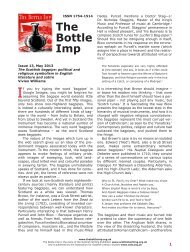
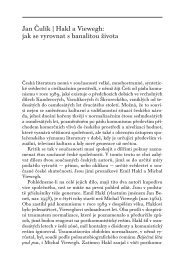

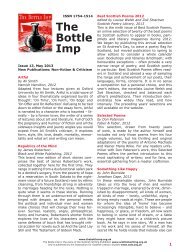
![IPA Index 1 People - E © M K C MacMahon 2007 E, [ ]: 1900.févr ...](https://img.yumpu.com/46502562/1/190x245/ipa-index-1-people-e-ac-m-k-c-macmahon-2007-e-1900facvr-.jpg?quality=85)

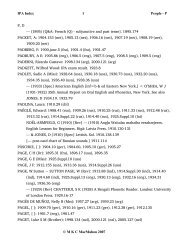
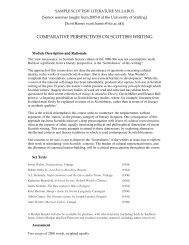
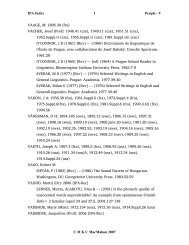
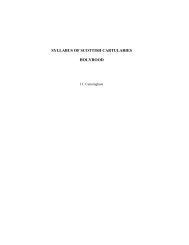
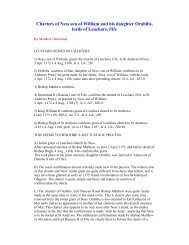

![IPA Index 1 People - D © M K C MacMahon 2007 D, [ ]: 1900.févr ...](https://img.yumpu.com/9908389/1/190x245/ipa-index-1-people-d-c-m-k-c-macmahon-2007-d-1900fevr-.jpg?quality=85)
